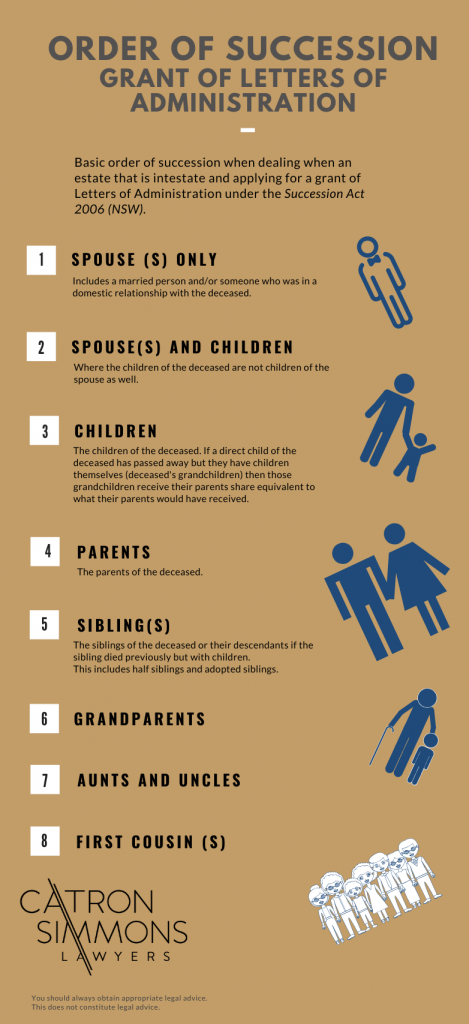A Letter of Administration occurs when a person dies without a will this is also known as ‘intestate.’ The family of the deceased must apply for a grant of letters of administration from the NSW Supreme Court in order to administer the estate. These estates are divided according to the Succession Act 2006 (NSW)
If there is a valid will in existence then the process is probate.
If there is not a valid will or no will an administrator must apply to the Supreme Court to distribute the estate in the manner prescribed by the Succession Act 2006.
Who can apply for the letter of administration?
The grant for administration is typically completed by the ‘next of kin’:-
- spouse of the deceased
- one or more of the next of kin (the application can be joint with a number of administrators)
- the spouse jointly with other relatives.
If there is no ‘next of kin’ or none that are appropriate or willing to apply for the grant the court may grant administration to:-
- NSW Trustee and Guardian
- Any other person the court sees fit.
Do I need a letter of Administration?
A letter of Administration is similar to probate in that it will need the formal authority from the NSW Supreme Court where there are assets if significant value. It is also common that some organisations insist upon a formal court order before releasing assets.
Having an estate dealt with formally also has an added advantage for the administrator with some important protections from being found personal liable for their dealings with the estate.
Order of Succession where estate in intestate

You should always seek legal advice in relation to obtaining a grant of letters of administration and/or probate. At Catron Simmons Lawyers we understand how difficult this time is. We give you the benefit of years of experience to ensure that the process is as smooth as possible.
Do I need to look for a will?
Yes, in order to obtain a letter of administration, the court requires you to prove that you have searched for any will or document conveyancing the deceased’s intention in regard to their estate.
Can I do this myself?
Applying for any grant of probate and/or letter of administration can be complicated and time-consuming process. It is critical that you understand your legal obligations in order to reduce time and money needlessly spent.
As an administrator and/or an executor there is also a a benefit in having a solicitor deal with the estate to provide a level of personal protection against claims of misuse of office.
Do I need to conduct a grant of letters of administration to update title deeds or certificate of titles?
In situations where the deceased was listed as a ‘joint tenant’ on the certificate of title, a grant is not required. The surviving joint tenant needs to complete a form from the NSW Land and Title Office titled ‘Notification of Death’.
A grant of letters of administration will be required in the following circumstances:
- Deceased was the sole registered owner
- deceased was a tenant-in-common
- deceased was a ‘joint tenant’ and the other tenant died before the deceased.
How long do I have to apply for a grant of letters of administation?
Executors should be applying for administration within six (6) months of the death of the deceased.
How long does it take to obtain a letter of administration?
Generally, it depends on how busy the NSW Supreme Court is and how the amount of requisitions from the court. Typically this process can be from one (1) month to four (4) months.
How much do you charge?
Our fees are fixed in nature in accordance with the scaled fees found in Schedule 3 of the Legal Profession uniform Law Application Regulation which are based off the value of the estate.
The fees are not paid for by the administrator and are taken out of the estate.
There are also associated filing fees by the court.
